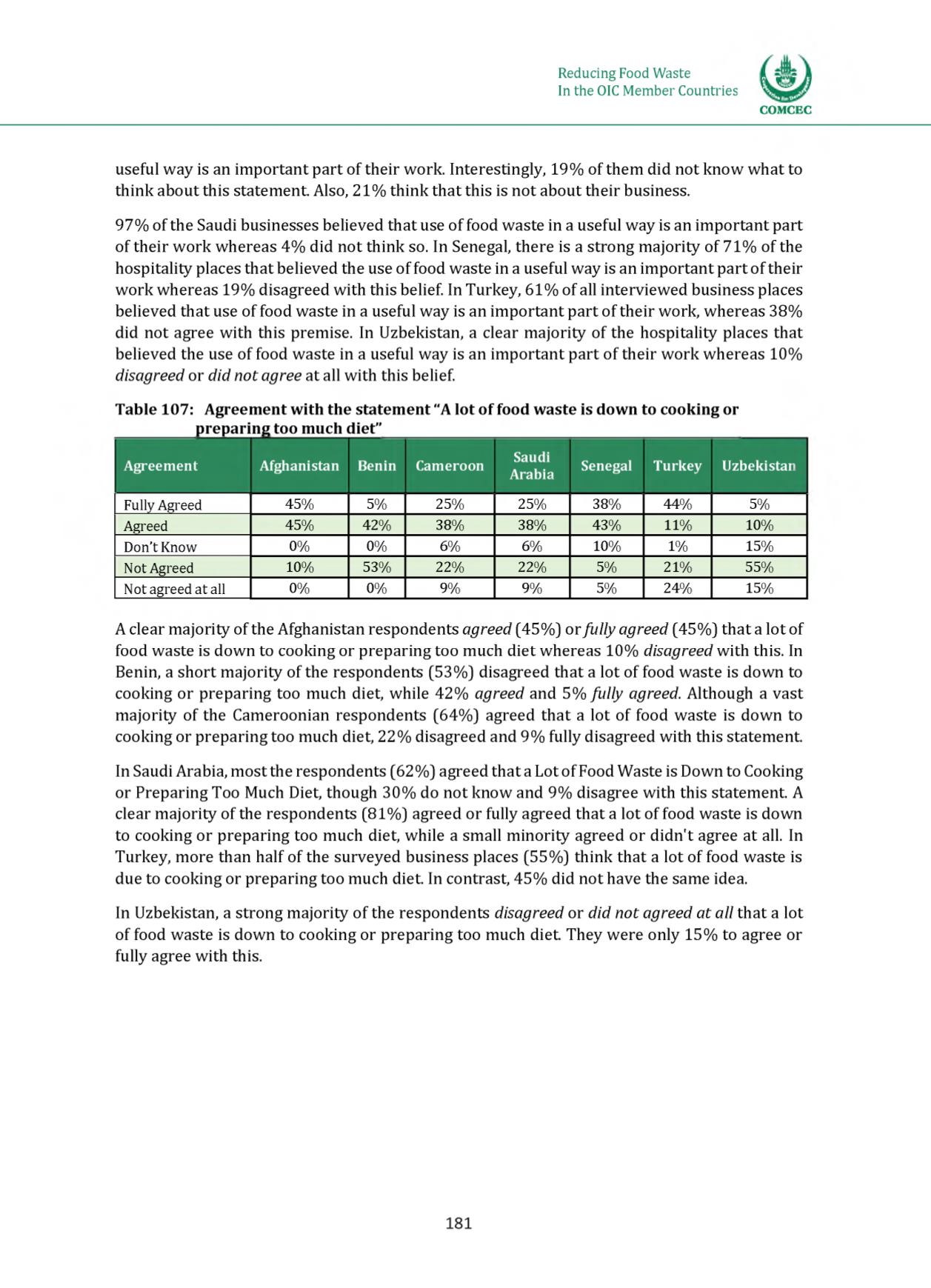

COMCEC
Reducing Food Waste
In the OIC Member Countries
useful way is an im po rtan t pa rt of their work. Interestingly, 19% of them d id no t know w h a t to
th ink abou t this statement. Also, 21% th ink th a t this is no t abou t their business.
97% of the Saudi businesses believed tha t use o f food waste in a useful way is an im po rtan t part
of their w o rk whereas 4% d id n o t th ink so. In Senegal, there is a strong majority of 71% of the
hospitality places tha t believed the use o f food waste in a useful way is an im po rtan t pa rt o f their
w o rk whereas 19% disagreed w ith this belief. In Turkey, 61% of all interviewed business places
believed tha t use of food waste in a useful way is an im po rtan t pa rt o f their work, whereas 38%
did no t agree w ith this premise. In Uzbekistan, a clear m ajority of the hospitality places tha t
believed the use of food waste in a useful way is an im po rtan t pa rt o f their wo rk whereas 10%
disagreed
or
did not agree
at all w ith this belief.
Table 107: Agreement with the statement "A lot of food waste is down to cooking or
___________preparing too much diet”_________________________________________________
Agreement
Afghanistan Benin Cameroon Saudi
Arabia Senegal
Turkey Uzbekistan
Fully Agreed
45% 5% 25% 25% 38% 44%
5%
Agreed
45% 42% 38%
38% 43% 11% 10%
Don’t Know
0%
0% 6%
6% 10% 1%
15%
Not Agreed
10% 53% 22% 22% 5% 21% 55%
Not agreed at all
0%
0% 9%
9%
5% 24% 15%
A clear majority of the A fghanistan respondents
agreed
(45%] or
fully agreed
(45% ) th a t a lo t of
food waste is dow n to cooking or preparing too much die t whereas 10%
disagreed
w ith this. In
Benin, a short m ajority of the respondents (53% ) disagreed tha t a lo t of food waste is dow n to
cooking or preparing too m uch diet, while 42%
agreed
and 5%
fully agreed.
A lthough a vast
majority of the Cameroonian respondents (64% ) agreed th a t a lo t of food waste is dow n to
cooking or preparing too much diet, 22% disagreed and 9% fully disagreed w ith this statement.
In Saudi Arabia, m o st the respondents (62% ) agreed tha t a Lot o f Food Waste is Down to Cooking
or Preparing Too Much Diet, though 30% do n o t know and 9% disagree w ith this statement. A
clear m ajority of the respondents (81% ) agreed or fully agreed tha t a lo t of food waste is down
to cooking or preparing too much diet, while a small m ino rity agreed or d id n 't agree at all. In
Turkey, more than ha lf of the surveyed business places (55% ) th ink tha t a lo t of food waste is
due to cooking or preparing too much diet. In contrast, 45% did n o t have the same idea.
In Uzbekistan, a strong majority o f the respondents
disagreed
or
did not agreed at all
th a t a lot
of food waste is dow n to cooking or preparing too much diet. They were only 15% to agree or
fully agree w ith this.
181
















